小学英语课题立项申请(B表)
- 格式:doc
- 大小:51.50 KB
- 文档页数:8
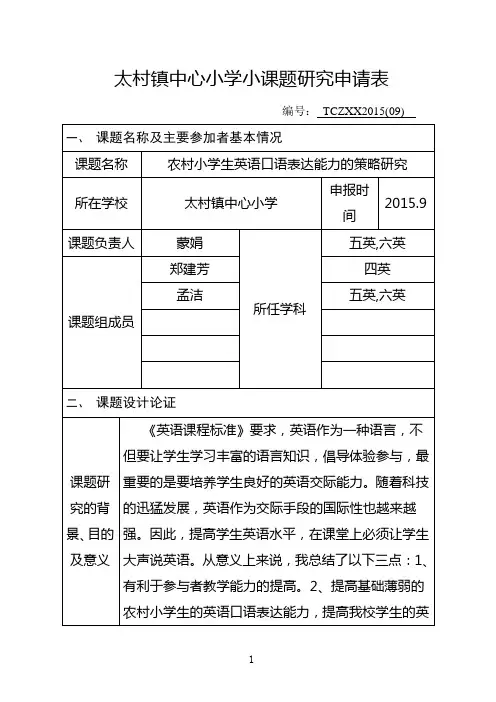
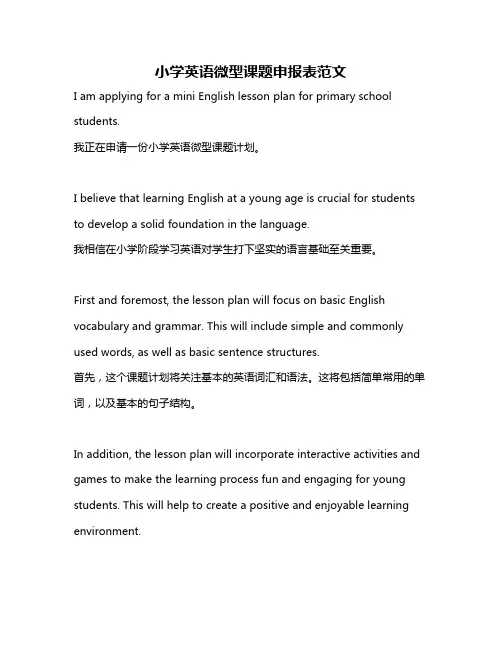
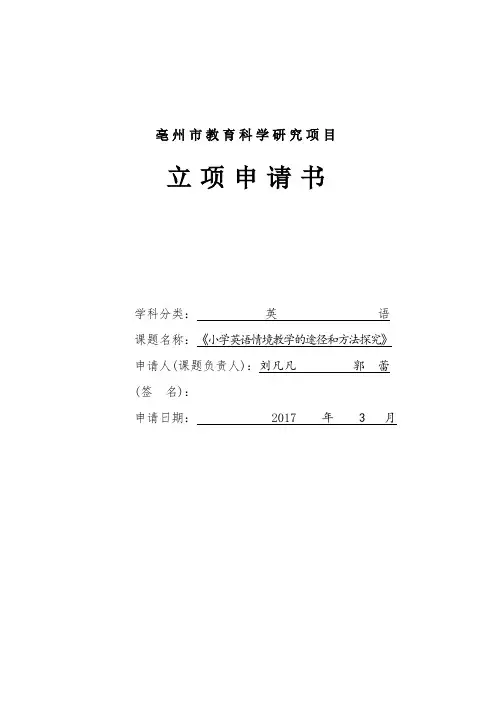
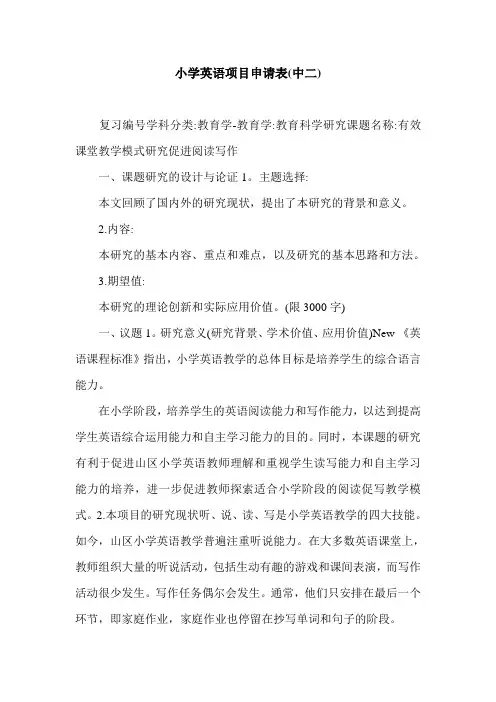
小学英语项目申请表(中二)复习编号学科分类:教育学-教育学:教育科学研究课题名称:有效课堂教学模式研究促进阅读写作一、课题研究的设计与论证1。
主题选择:本文回顾了国内外的研究现状,提出了本研究的背景和意义。
2.内容:本研究的基本内容、重点和难点,以及研究的基本思路和方法。
3.期望值:本研究的理论创新和实际应用价值。
(限3000字)一、议题1。
研究意义(研究背景、学术价值、应用价值)New 《英语课程标准》指出,小学英语教学的总体目标是培养学生的综合语言能力。
在小学阶段,培养学生的英语阅读能力和写作能力,以达到提高学生英语综合运用能力和自主学习能力的目的。
同时,本课题的研究有利于促进山区小学英语教师理解和重视学生读写能力和自主学习能力的培养,进一步促进教师探索适合小学阶段的阅读促写教学模式。
2.本项目的研究现状听、说、读、写是小学英语教学的四大技能。
如今,山区小学英语教学普遍注重听说能力。
在大多数英语课堂上,教师组织大量的听说活动,包括生动有趣的游戏和课间表演,而写作活动很少发生。
写作任务偶尔会发生。
通常,他们只安排在最后一个环节,即家庭作业,家庭作业也停留在抄写单词和句子的阶段。
一些教师担心课堂写作会占用更多的时间,影响教学进度,而另一些教师则认为“写作”不如听、说、做、唱等活动那么生动,“写作”会冲淡课堂教学原有的生动气氛,在一定程度上降低课堂的活力。
原因是:一是教师缺乏对学生系统写作知识的策略指导;其次,学生缺乏时间和空间去思考和消化他们所学的句子和单词。
第三,学生不会积累很多单词和句子。
这些原因导致了一个恶性循环,即学生一开始盲目写作,不愿意写,害怕写,最后拒绝写。
这也导致许多小学毕业生进入初中后读写基础薄弱。
二、研究的基本内容、重点和难点、研究目的的基本思路和方法:提高学生的读写能力和自主学习能力,促进探索小学英语教师通过阅读促进写作的有效课堂模式。
基本内容:1.通过多角度有意识的课堂阅读指导和训练,提高学生的阅读能力,使学生掌握一定的阅读策略。
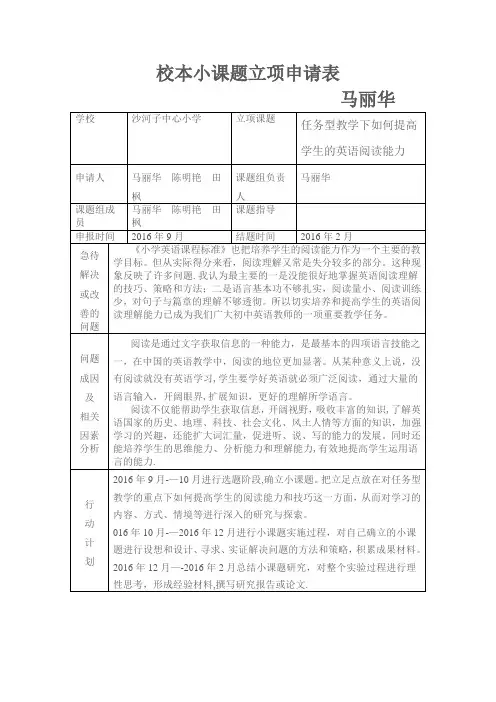
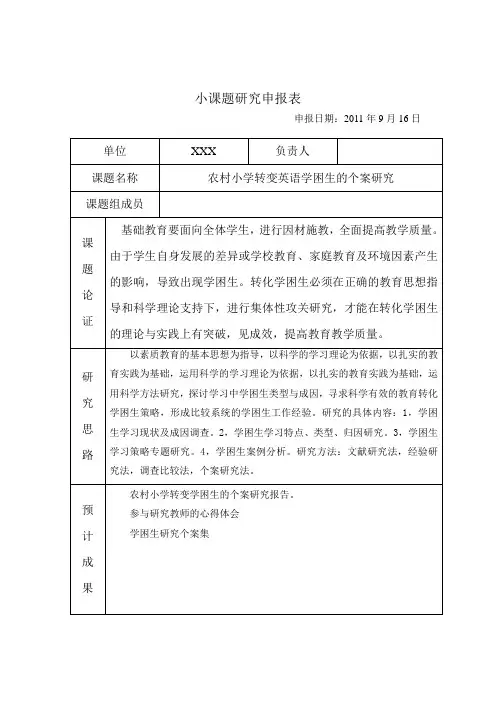
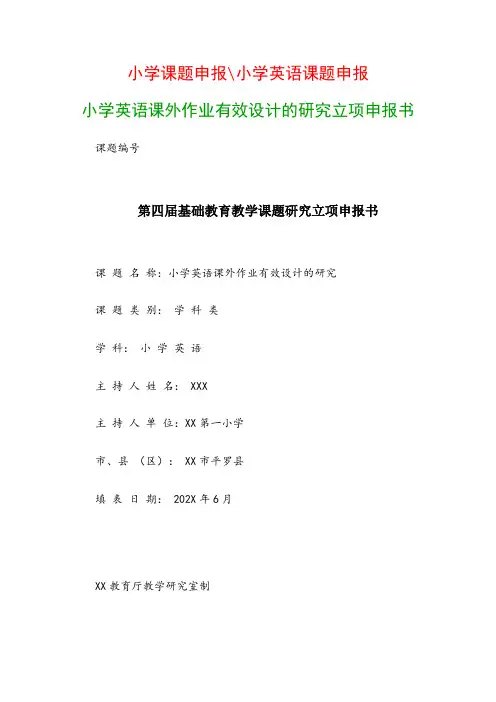
小学课题申报\小学英语课题申报小学英语课外作业有效设计的研究立项申报书课题编号第四届基础教育教学课题研究立项申报书课题名称:小学英语课外作业有效设计的研究课题类别:学科类学科:小学英语主持人姓名: XXX主持人单位:XX第一小学市、县(区): XX市平罗县填表日期: 202X年6月XX教育厅教学研究室制填表说明1.本表可在自治区教研室网站“课题研究—课题研究公告”栏目下载。
2.填写内容统一字体为:楷体,字号为小四。
使用A4纸正反面打印,左侧装订,封面不得使用塑料封皮,上报时一式三份装在牛皮档案袋内。
3.封面除“课题编号”“是否立项”不填外,其他不得有空白项:课题名称:应准确、简明反应研究内容,最多不超过26个汉字(包括标点符号);课题类别:根据《宁夏第四届基础教育教学课题研究方向参考指南》填写以下其中一项:综合类、信息化教学资源有效应用类、学科类、学前教育类;学科:根据国家课程方案中设置的学科类别准确填写,不属于任何一类学科的请填写“其它”;课题组核心成员基本情况(≤10人):此项不包含主持人基本情况。
4.课题申报人所在单位要对其申报资格和研究条件进行认真审核,签署书面意见并盖章。
填写内容要实事求是,文字表述清楚,简明扼要,严格按照要求填写,不得更改表格内容和格式。
5.各市教研室将《宁夏第四届基础教育教学课题研究立项申报书》纸质版(一式三份)和电子版打包报送自治区教研室。
申报书电子版命名为市县(区)+主持人姓名+课题名称。
6.所有上交材料不退,请自行备份。
课题名称小学英语课外作业有效设计的研究课题类别学科类学科小学英语一、课题主持人基本情况主持人姓名 XXX 性别男参加工作时间 202X年级英语作业写的少,学生学英语的兴趣浓厚,但是到了高年级,随着写的作业增多,许多同学开始不适应,成绩也下降很快。
所以小学英语课外作业有效设计的研究迫在眉睫。
小学英语课外作业作为课堂教学的延伸和补充,课外作业是课堂教学的重要环节。
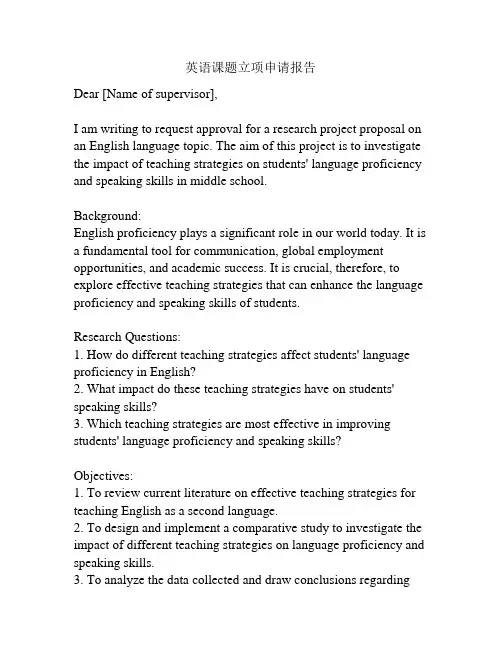
英语课题立项申请报告Dear [Name of supervisor],I am writing to request approval for a research project proposal on an English language topic. The aim of this project is to investigate the impact of teaching strategies on students' language proficiency and speaking skills in middle school.Background:English proficiency plays a significant role in our world today. It is a fundamental tool for communication, global employment opportunities, and academic success. It is crucial, therefore, to explore effective teaching strategies that can enhance the language proficiency and speaking skills of students.Research Questions:1. How do different teaching strategies affect students' language proficiency in English?2. What impact do these teaching strategies have on students' speaking skills?3. Which teaching strategies are most effective in improving students' language proficiency and speaking skills? Objectives:1. To review current literature on effective teaching strategies for teaching English as a second language.2. To design and implement a comparative study to investigate the impact of different teaching strategies on language proficiency and speaking skills.3. To analyze the data collected and draw conclusions regardingthe most effective teaching strategies for improving language proficiency and speaking skills.Methodology:1. Literature Review: Conduct a comprehensive review of existing research papers, articles, and books related to teaching strategies in English language education.2. Data Collection: Select a sample of middle school students and divide them into groups. Each group will be taught using a different teaching strategy, such as direct instruction, cooperative learning, or task-based learning. Assessments such as standardized tests and speaking tasks will be used to measure language proficiency and speaking skills before and after the intervention.3. Data Analysis: Analyze the collected data using statistical methods to determine the impact of each teaching strategy on students' language proficiency and speaking skills.4. Conclusion: Summarize the findings and draw conclusions regarding the most effective teaching strategies for improving language proficiency and speaking skills.Anticipated Outcomes:By the completion of this project, it is anticipated that we will gain a deeper understanding of the effectiveness of various teaching strategies in enhancing students' language proficiency and speaking skills. This research will contribute to the existing literature on language education and provide guidance to educators in selecting appropriate teaching strategies.Timeline:- Literature Review: 2 months- Data Collection: 3 months- Data Analysis: 1 month- Report Writing: 1 monthBudget:The anticipated budget for this research project includes expenses related to data collection and analysis, participant incentives, and research materials. A detailed budget proposal will be submitted upon approval of the project.I believe that this research project will bring valuable insights and contribute to the improvement of English language education in middle schools. I kindly request your approval and support to proceed with this proposed project.Thank you for considering my application. I am available for further discussion or clarification if needed.Sincerely,[Your Name]。
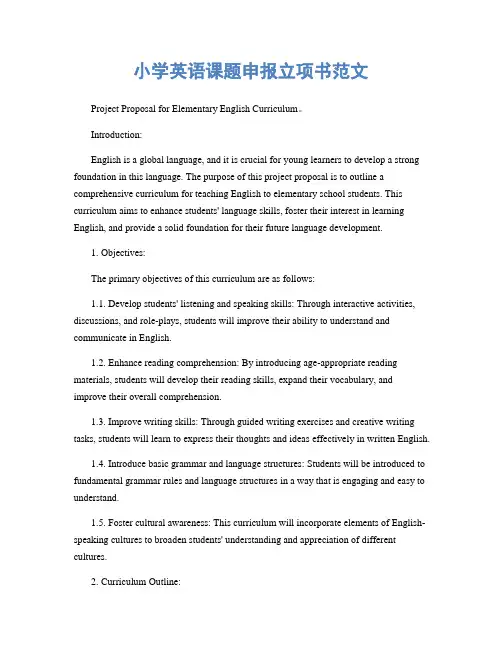
小学英语课题申报立项书范文Project Proposal for Elementary English Curriculum。
Introduction:English is a global language, and it is crucial for young learners to develop a strong foundation in this language. The purpose of this project proposal is to outline a comprehensive curriculum for teaching English to elementary school students. This curriculum aims to enhance students' language skills, foster their interest in learning English, and provide a solid foundation for their future language development.1. Objectives:The primary objectives of this curriculum are as follows:1.1. Develop students' listening and speaking skills: Through interactive activities, discussions, and role-plays, students will improve their ability to understand and communicate in English.1.2. Enhance reading comprehension: By introducing age-appropriate reading materials, students will develop their reading skills, expand their vocabulary, and improve their overall comprehension.1.3. Improve writing skills: Through guided writing exercises and creative writing tasks, students will learn to express their thoughts and ideas effectively in written English.1.4. Introduce basic grammar and language structures: Students will be introduced to fundamental grammar rules and language structures in a way that is engaging and easy to understand.1.5. Foster cultural awareness: This curriculum will incorporate elements of English-speaking cultures to broaden students' understanding and appreciation of different cultures.2. Curriculum Outline:2.1. Listening and Speaking Skills:Engage students in conversations and discussions on various topics.Utilize audiovisual materials, such as songs, videos, and podcasts, to enhance listening skills.Encourage students to participate in group activities and presentations to improve their speaking abilities.2.2. Reading Comprehension:Introduce a wide range of reading materials, including storybooks, articles, and poems.Incorporate reading comprehension exercises to enhance students' understanding of the texts.Encourage students to discuss and analyze the content of the reading materials.2.3. Writing Skills:Teach students basic writing skills, such as sentence structure, paragraph organization, and punctuation.Provide writing prompts and encourage students to express their thoughts and ideas through writing.Offer feedback and guidance to help students improve their writing skills.2.4. Grammar and Language Structures:Introduce grammar concepts through interactive activities and games.Provide clear explanations and examples to ensure students grasp the fundamental rules of English grammar.Reinforce grammar knowledge through practice exercises and quizzes.2.5. Cultural Awareness:Introduce English-speaking countries and their cultures through multimedia resources.Incorporate cultural activities, such as celebrating festivals and exploring traditions, to foster students' cultural awareness.3. Teaching Methodology:3.1. Communicative Approach: This curriculum will prioritize interactive and communicative activities to engage students actively in the learning process.3.2. Task-Based Learning: Students will be given real-life tasks to complete, promoting practical application of the language skills they have learned.3.3. Differentiated Instruction: The curriculum will cater to students' diverse learning needs by providing various learning materials and activities.3.4. Assessment and Feedback: Regular assessments will be conducted to evaluate students' progress, and constructive feedback will be provided to guide their learning.Conclusion:This project proposal outlines a comprehensive curriculum for teaching English to elementary school students. By focusing on developing listening, speaking, reading, writing skills, as well as introducing grammar and cultural awareness, this curriculum aims to provide students with a solid foundation in English. Through engaging and interactive teaching methodologies, students will be motivated to learn and develop a lifelong interest in the English language.。
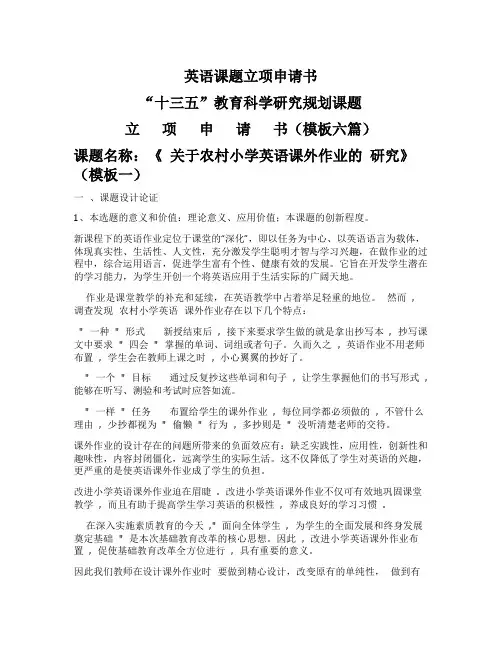
英语课题立项申请书“十三五”教育科学研究规划课题立项申请书(模板六篇)课题名称:《关于农村小学英语课外作业的研究》(模板一)一、课题设计论证1、本选题的意义和价值:理论意义、应用价值;本课题的创新程度。
新课程下的英语作业定位于课堂的“深化”,即以任务为中心、以英语语言为载体,体现真实性、生活性、人文性,充分激发学生聪明才智与学习兴趣,在做作业的过程中,综合运用语言,促进学生富有个性、健康有效的发展。
它旨在开发学生潜在的学习能力,为学生开创一个将英语应用于生活实际的广阔天地。
作业是课堂教学的补充和延续,在英语教学中占着举足轻重的地位。
然而,调查发现农村小学英语课外作业存在以下几个特点:" 一种" 形式新授结束后, 接下来要求学生做的就是拿出抄写本, 抄写课文中要求" 四会" 掌握的单词、词组或者句子。
久而久之, 英语作业不用老师布置, 学生会在教师上课之时, 小心翼翼的抄好了。
" 一个" 目标通过反复抄这些单词和句子, 让学生掌握他们的书写形式, 能够在听写、测验和考试时应答如流。
" 一样" 任务布置给学生的课外作业, 每位同学都必须做的, 不管什么理由, 少抄都视为" 偷懒" 行为, 多抄则是" 没听清楚老师的交待。
课外作业的设计存在的问题所带来的负面效应有:缺乏实践性,应用性,创新性和趣味性,内容封闭僵化,远离学生的实际生活。
这不仅降低了学生对英语的兴趣,更严重的是使英语课外作业成了学生的负担。
改进小学英语课外作业迫在眉睫. 改进小学英语课外作业不仅可有效地巩固课堂教学, 而且有助于提高学生学习英语的积极性, 养成良好的学习习惯.在深入实施素质教育的今天," 面向全体学生, 为学生的全面发展和终身发展奠定基础" 是本次基础教育改革的核心思想。
因此, 改进小学英语课外作业布置, 促使基础教育改革全方位进行, 具有重要的意义。
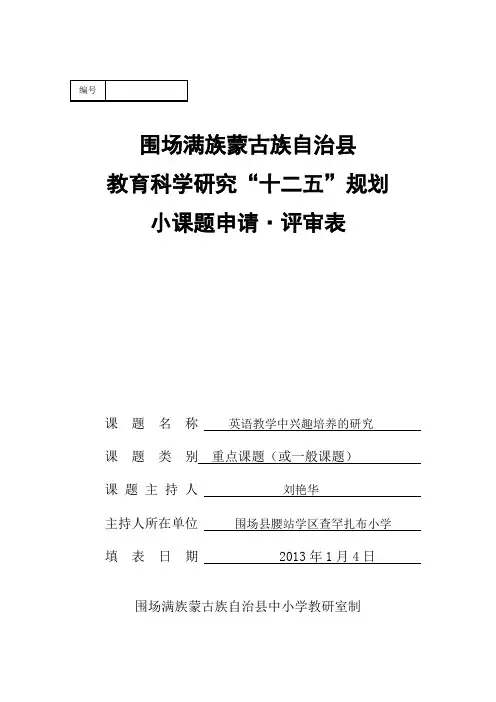
围场满族蒙古族自治县教育科学研究“十二五”规划小课题申请·评审表课题名称英语教学中兴趣培养的研究课题类别重点课题(或一般课题)课题主持人刘艳华主持人所在单位围场县腰站学区查罕扎布小学填表日期 2013年1月4日围场满族蒙古族自治县中小学教研室制申请者的承诺:我保证如实填写本表各项内容。
如果获准立项,我承诺以本表为有约束力的协议,遵守围场满族蒙古族自治县中小学教研室的有关规定,认真开展研究工作,取得预期研究成果。
围场满族蒙古族自治县中小学教研室有权使用本表所有数据和资料。
申请者(签章):2013年 1 月 4 日填表说明一、请用计算机或钢笔准确如实填写各项内容,书写要清晰、工整。
二、本表报送一式3份,左侧装订成册.三、封面上方代码框申请人不填,其他栏目由申请人用中文填写。
四、本表所附“课题设计论证”活页供评审使用,必须填写,但不得出现申请人和课题组成员姓名、单位名称等个人资料。
否则,不予进入评审程序。
五、请按“填写数据表注意事项”的要求,准确、清晰地填写数据表各栏内容;若有其他不明问题,请与围场满族蒙古族自治县教育科学规划领导小组办公室(围场中小学教研室316室)联系。
六、申请书须经课题负责人所在单位领导审核,签署明确意见,承担信誉保证并加盖公章后方可上报。
填写数据表注意事项课题名称 应准确、简明反映研究内容。
一般不超过20个汉字(包括标点符号)。
主 题 词 按研究内容设立。
主题词最多不超过3个,主题词之间空一格。
预期成果 系指预期取得的最终研究成果形式。
请选项填写,最多限报2项.例如:A 。
专著B .译著C 。
论文D .研究报告E .实验报告F .工具书G 。
电脑软件H 。
其他工作单位 按单位和部门公章全称填写。
主要参加人员 必须真正参加本课题的研究工作,不含课题负责人。
不包括科研管理、财务管理、后勤服务等人员.栏目不够时可另加页.联系电话 必须填写课题负责人的电话号码.一、数据表二、课题研究主要参加人员三、负责人和课题组成员近三年来取得的与本课题有关的研究成果四、负责人和课题组成员“十一五"规划期间承担的研究课题五、课题设计论证①总结提高学生英语学习兴趣的策略,撰写教学论文、教学随笔、教学案例等.②对所搜集的资料进行整理、筛选,撰写课题研究报告。
培养小学生英语阅读能力的课题申请《培养小学生英语阅读能力的课题申请》一、立项依据英语教育在中国的普及和推广已经取得显著成效,然而小学生英语阅读能力相对较弱,不仅束缚了他们的学习兴趣和表达能力的发展,也影响了他们未来的学习和职业发展。
因此,本课题旨在通过系统的英语阅读教育方法和策略,提高小学生英语阅读能力。
二、课题意义1. 实现教育目标:小学阶段是培养学生基本的学习和思维能力的关键时期,而英语作为国际交流的重要工具,培养小学生的英语阅读能力,有助于帮助他们更好地应对未来的学习和事业挑战。
2. 提高综合能力:英语阅读是对听、说、读、写四个技能的综合运用,通过提高小学生的阅读能力,有助于提高他们在听、说、读、写各方面的英语综合能力。
3. 拓展视野:通过阅读英语原版图书、报纸、杂志和网站等,可以帮助小学生拓宽视野,了解国际社会的潮流和发展动态,促进跨文化交流和理解。
4. 提高表达能力:英语阅读能力的提高,将有助于小学生提高他们的表达能力,使他们能够更自信地进行口语表达和写作。
三、研究内容及目标1. 研究内容(1)小学英语阅读教育的现状分析:通过对目前小学英语阅读教育的问题和挑战进行深入了解和研究,为制定切实可行的阅读教育策略提供依据。
(2)小学英语阅读教育的原则和方法:总结和归纳成功的英语阅读教育经验,探讨适合小学生的英语阅读教育原则和方法。
(3)小学英语阅读教材的开发与评价:根据小学生的学习特点和英语阅读能力需求,开发适合小学生的英语阅读教材,并进行评估和反馈。
(4)小学英语阅读教育的课程设计:设计小学英语阅读教育的有效课程,包括教学目标、教学内容、教学方法和教学评价等。
2. 研究目标(1)提高小学生的英语阅读能力,包括词汇量、阅读理解和阅读速度等方面。
(2)培养小学生的阅读兴趣和阅读习惯,促进他们对英语阅读的主动参与。
(3)推广和分享成功的英语阅读教育经验,为其他学校和教师提供参考。
四、研究方法与步骤1. 研究方法(1)文献综述:对相关文献、报刊、论文进行综合分析和研究,了解国内外小学英语阅读教育的发展状况和成果。